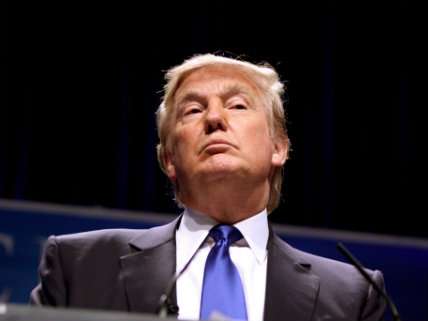Why Donald Trump's Foreign Policy Team Baffles the GOP Establishment
Conservative foreign policy counsels are stacked with status quo hawks, so Trump's less interventionist crew draws from the fringes.

Until recently, Donald Trump was seeking foreign policy counsel from two sources. The first was "the shows" where "you have the generals and you have certain people," and the second was himself, because, in his own words, "I have a very good brain."
It doesn't exactly smack of Henry Kissinger, or even Barack Obama's ballyhooed "team of rivals." Perhaps recognizing this deficiency, Trump came to a meeting with the Washington Post editorial board on Monday holding a list of five foreign policy gurus who had signed onto his campaign: Walid Phares, Keith Kellogg, Carter Page, George Papadopoulos, and Joseph E. Schmitz. "That's a pretty representative group," Trump proclaimed.
It's also a pretty unknown group, at least for those who keep up with foreign policy bigwigs in Washington. While Ted Cruz's campaign has become a bug light for the right's usual characters, including yet another afterlife granted to Elliott Abrams, Trump's hires are more obscure and outside the traditional establishment. Only Walid Phares rings bells, thanks to his visibility on Fox News and NBC.
Phares is a Maronite Christian who grew up in Lebanon. During the 15-year-long Lebanese Civil War, he helped organize and Christianize the Lebanese Forces, a militia-cum-political party that today is part of Lebanon's March 14 Alliance. March 14 is viscerally opposed to Hezbollah and the rule of Bashar al-Assad in neighboring Syria (its opposite, March 8, is pro-Hezbollah and pro-Assad). It's also highly skeptical of Iran, which bolsters Shia-aligned entities like Hezbollah and the Syrian regime through funds and training.
Phares' views on the Middle East seem to be refracted through his March 14 background. While he's not maximally hawkish on every issue—he presciently cautioned that Gaddafi's fall in Libya could result in "a takeover, after the authoritarian collapse, by Islamists"—he is a vociferous skeptic of Iran. "It is Iran that is threatening the region and the entire world," he told Al Jazeera in 2007. He more recently warned that President Obama's nuclear deal with Tehran was "Washington's gravest foreign policy mistake."
Joseph E. Schmitz, another of Trump's newly hired advisors, was the inspector general for the Defense Department during the Bush administration. Since 2012, he's maintained an archive at the conservative website Newsmax.com where he's written mostly about Obamacare (oddly enough), but also about foreign policy. His writings are full of brimstone over the Obama administration's feeble response to ISIS and Islamic terrorism in general.
But wait. Back when the United States was mulling over military action in Syria, Schmitz took exception, and suggested that instead of leaning on the Assad regime we should be attacking the Nusra Front, the local franchise of al Qaeda. Or, "as an alternate strategy," Schmitz wrote, "the United States might just refrain from engaging in any new acts of war while our enemies are killing each other." And following Edward Snowden's revelations about the NSA, Schmitz demanded to know why the Defense Department hadn't implemented greater protections years ago. He called on the NSA to "be scrutinized to safeguard civil liberties and privacy."
Then there's Carter Page who has fingered the Obama administration for "misguided and provocative actions" towards Vladimir Putin, and accused State Department staffer Victoria Nuland of unnecessarily "fomenting" unrest in Ukraine.
Trump's picks have bewildered the Republican foreign policy establishment and drawn a volley of blog posts calling them "rotten" and "dangerous." That may very well be true—Schmitz, for example, buys into the Frank Gaffney-pushed chestnut that Grover Norquist is collaborating with Muslim Brotherhood-affiliated groups—but it also misses a key distinction. Overall, Trump's squad is roughly aligned with its candidate's view of foreign policy: hold Islam in contempt, strike deals with other countries only if they lean heavily in your favor, stay out of other countries' civil wars, look to Andrew Jackson for precedent.
Last year, Robert Draper, the New York Times reporter who chronicled the "libertarian moment," went in search of the Republican foreign policy establishment. He found a peripatetic cast of old hands who, though they mumbled denunciations of the war in Iraq, still took a hawkish approach to just about every other international problem. This is explains why conservative foreign policy counsels are stacked with status quo neoconservatives while Trump's marginally less interventionist crew must draw from the fringes.
Bad ideas stay alive in Washington because they're incubated in an insular mainstream. If those who truly care about national security want to reform after the failures of Iraq, it needs to start with its expert class.
Matt Purple is a fellow at the American Security Initiative Foundation. ?


Show Comments (51)